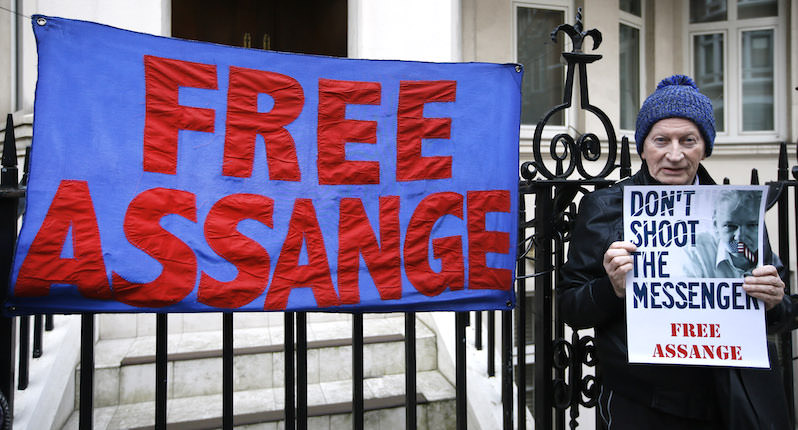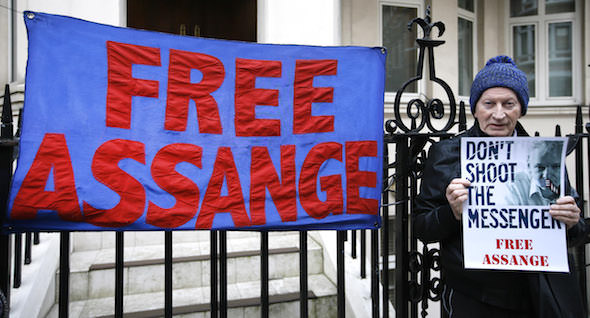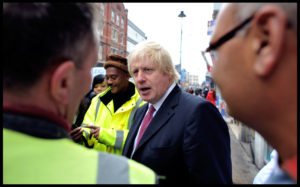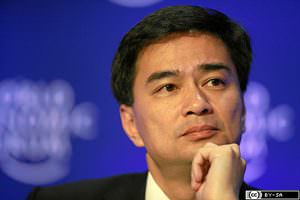Julian Assange ‘Arbitrarily Detained,’ a U.N. Panel Has Found
The panel is expected to announce Friday a finding that the WikiLeaks founder's long stay in Ecuador's London embassy is the result of improper actions by Sweden and Britain.

Outside the Ecuadorean Embassy in London. (Kirsty Wigglesworth / AP)
The U.N. Working Group on Arbitrary Detention is expected to announce Friday that WikiLeaks founder Julian Assange’s long stay in the Ecuadorean Embassy in London amounts to unlawful detention.
A Swedish Foreign Ministry spokeswoman said Thursday that the U.N. panel had found that Assange is being “arbitrarily detained.”
The panel’s judgment is not legally binding, but it can be used as leverage in human rights cases.
Assange, charged in Sweden in a sexual misconduct case, has found refuge in the embassy since 2012. He fears that if he is taken to Sweden he will be extradited to the United States to be prosecuted for publishing secret documents detailing American atrocities in the Iraq and Afghanistan wars. He has been granted asylum in Ecuador but has remained in its London embassy for more than three years because he could be immediately arrested by the British if he left the complex. A country’s authorities are forbidden to enter foreign embassies.
According to Assange’s lawyer, if the U.N. panel announces that Assange was arbitrarily detained, as expected, Sweden is obligated to compensate him for the 1,885 days he has been in the embassy. Assange announced in a press conference Wednesday that he would turn himself over to the British police on Friday if the U.N. group ruled against him.
The panel’s findings were disclosed to the Swedish and British governments on 22 January, and will be published on Friday morning. Their judgment is not legally binding but can be used to apply pressure on states in human rights cases.
Anna Ekberg, spokesperson for the Swedish foreign ministry, said: “The UN working group on arbitrary detention has concluded that Mr Assange is arbitrarily detained. The working group’s view differs from that of the Swedish authorities. We will forward a reply to the working group tomorrow. It will be more clear tomorrow why we reject the working group’s conclusions.”
Assange’s Swedish lawyer, Per Samuelson, said earlier that if the working group found in his favour, “there is only one solution for Marianne Ny [the Swedish prosecutor seeking Assange’s extradition to Sweden], and that is to immediately release him and drop the case”. Samuelson added: “If he is regarded as detained, that means he has served his time, so I see no other option for Sweden but to close the case.”
Assange’s lawyers demanded assurances from the UK that he would not be arrested and subjected to extradition proceedings to face potential prosecution over WikiLeaks’ publishing activities.
The British Foreign Office said it would not pre-empt the panel’s findings, but said in a statement: “We have been consistently clear that Mr Assange has never been arbitrarily detained by the UK but is, in fact, voluntarily avoiding lawful arrest by choosing to remain in the Ecuadorian embassy.
In 2010, through a leak by whistleblower Chelsea Manning, WikiLeaks exposed a huge number of classified U.S. documents. Subsequently, the U.S. government launched a criminal case against Assange. Manning — formerly Bradley Manning, an enlisted person in the U.S. Army — is serving a prison senence for disclosing the computer files.
You can read the reasons Assange believes he should be protected by the U.N. here.
— Posted by Donald Kaufman
As we navigate an uncertain 2025, with a new administration questioning press freedoms, the risks are clear: our ability to report freely is under threat.
Your tax-deductible donation enables us to dig deeper, delivering fearless investigative reporting and analysis that exposes the reality beneath the headlines — without compromise.
Now is the time to take action. Stand with our courageous journalists. Donate today to protect a free press, uphold democracy and uncover the stories that need to be told.




You need to be a supporter to comment.
There are currently no responses to this article.
Be the first to respond.